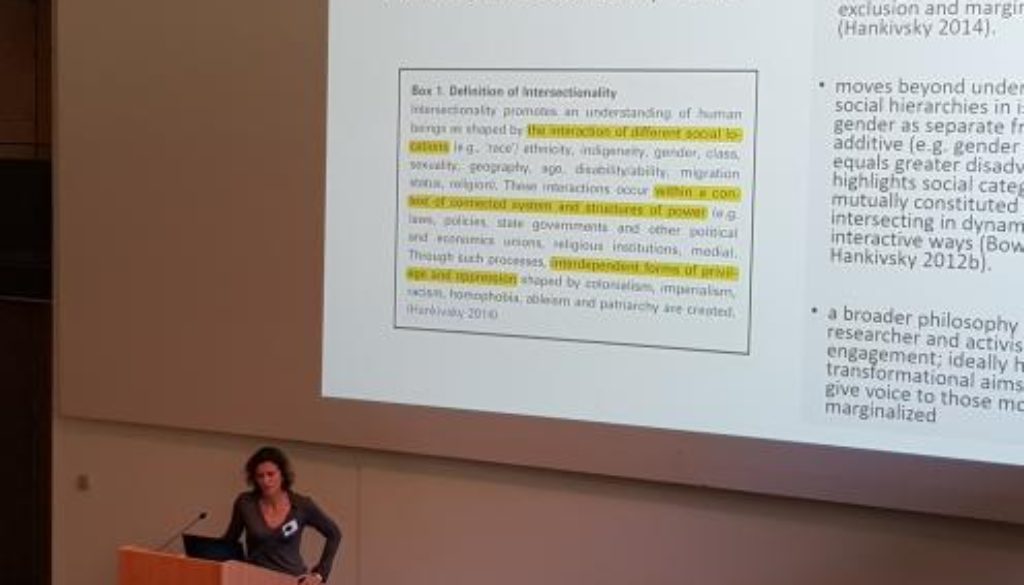Global health ethics frameworks, embedded ethics and new approaches to vulnerability
We recently attended the 2017 Oxford Global Health and Bioethics International Conference, aimed at promoting multidisciplinary and inclusive discussion of critically important ethical issues in global health. We were excited about several issues pertinent to health policy and systems research ethics discussed during this excellent meeting.
Bridget Pratt and Sassy Molyneux
The importance of health system strengthening was highlighted right from the opening keynote of the Oxford Global Health and Bioethics International Conference. Devi Sridhar in her talk ‘Governing Global Health: Who Runs the World and Why?’ emphasised that power in global health governance lies with three main actors—the United States, United Kingdom, and the Bill and Melinda Gates Foundation. Several high-profile attendees commented on the distinction between technology or disease-focused versus systems-focused approaches, and asked how donors can be incentivised to be more systems-focused. They also raised concerns about “reverse priorities” where health systems are a central focus in high income countries (e.g. Obamacare and the UK National Health Service), but relatively neglected for Low- and Middle-Income Countries. Power, politics and equity were thereby raised as critical ethical issues in global health; issues that were also central concerns in the 2016 Health Systems Symposium.
Jeff Khan in his keynote ‘Ethics on the horizon: A proposal for a future-facing global bioethics’ included health systems research ethics in his list of priorities. He also had two suggestions that we think are especially relevant for the emerging field of health policy and systems research ethics. First, that global bioethics should make far greater use of existing global health ethics frameworks such as Benatar, Daar, and Singer’s that emphasise values such as solidarity, equity, democracy, and sustainability. We agree, and have regularly referenced this framework in our own HPSR materials.
Second, he suggested ethicists practice more “embedded ethics”. Reflecting on this, we understand embedded ethics could come in a variety of forms. For example, Bridget is an ethicist co-located within an ethics institute and a global health institute, and Sassy is a social scientist studying ethics issues as part of several multi-disciplinary research projects and on behalf of the institution she is part of. Being a co-located ethicist or social scientist can be invaluable in ensuring there is regular, open and honest dialogue and deeper learning between ethicists and health policy and systems researchers. Ethics issues can potentially be identified and responded to more efficiently and effectively. However, there are potential challenges: ethicists’ foci may be shaped by the research they are linked to, and they may lose objectivity and the ability to be critical of the studies or institutions they are part of. We have already begun to reflect on some of our embedded work, and would value ideas and experiences from others.
The meeting closed with keynote presentations given by three inspiring women: Ruth Macklin, Florencia Luna and Maureen Kelley. Maureen Kelley presented last, giving a rich example of an international collaboration conducting diverse forms of embedded ethics research. That research aims to feed into policy and practice and conceptual thinking on a hotly debated topic in bioethics: vulnerability. The collaboration takes forwards conceptual work by Luna and others who have argued that vulnerability should be understood as a layered conceptrather than a label given to sub-populations . We were struck in Luna’s presentation with some overlaps in her conceptualisation of vulnerability with intersectionality analysis in other fields and with concepts of systematic/corrosive disadvantage from philosophy. We had described intersectionality analysis earlier in the meeting when introducing the partnership for research on gender and ethics (RinGs). Moving forwards, we think it would be exciting to see how Luna and others’ ideas on vulnerability and disadvantage might feed into our intersectional analyses in RinGs, and consider whether an intersectional lens could enrich our reflections in RinGs and the ethics TWG at HSG on embedded ethics, vulnerability, resilience and empowerment. Watch this space (or, ideally, fill it!).

